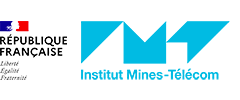IN-COMPANY TRAINING: Results of an exclusive study by the Institut Mines-Télécom
This study looks at the challenges that lie ahead for in-company training. it was conducted by the Institut Mines-Télécom as a continuation of its participation in the “Osons l’industrie du futur” project led by the Industry of the Future Alliance, on the evolution of trades and skills and how to prepare for them through training.
Evolution of expected skills and professions
Digital transformation has come into the working world through new technologies and is bringing about profound changes in the structure of jobs. The disappearance of certain (often low-skilled) jobs is on the cards, while new occupations requiring new skills are emerging. The study shows that employees need to be trained throughout their lives, whether through initial training, lifelong learning or independent study. The reality today is that technical skills are no longer sufficient and must be combined with soft skills that are increasingly sought after by employers. Training operators therefore need to use these various observations as a basis for reviewing their training courses or creating new ones that are more in line with market needs.
The digital transformation accelerator
Market pressure requires organizational structures to evolve continually with the development of new technologies and managerial practices. The study shows that the context of digital transformation has accelerated this process. Certain factors, generally associated with agile structures, had already been identified in the 1980s and 1990s (collaborative practices, more horizontal management for example). Training organizations are no exception and are also having to review and rethink their organization to gain in agility and become more efficient in implementing more innovative training paths.
Companies, new entrants to the training market
With the acceleration of digital transformation, the training sector is evolving very rapidly and competition in this market is increasingly intense. The changing needs in key skills for the future in all sectors is an increasingly strategic issue for companies and represents a real challenge in competitiveness. Companies look to the training sector to better meet their needs. In our study, we note that in order to better respond to these requirements for identifying the necessary skills and training, it is in the interests of the various players in the training sector to cooperate with each other make the most of their complementarity in the training they offer. The grandes écoles and universities are included in this new environment and should take account of these major developments in their programs, even if they remain the guarantors of academic excellence.
Companies need to train their employees in new specific skills and know-how, and internal training structures have been set up for this purpose. The concept of the learning organization is more relevant than ever.
On the other hand, it highlights the new means devoted to training which go towards diversifying resources, modes and paces of learning with new possibilities open to adaptive learning and more personalized learner/user paths. In this respect, traditional training operators also have an interest in diversifying their learning modalities in order to better respond to the evolving needs of their learners.


















